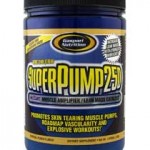 A recently published study examined testosterone and dihydrotestosterone in collegiate age athletes. While creatine is widely considered a non-hormonal supplement, evidence provided by this study seems to indicate the opposite; although supplementation with creatine did not effect serum testosterone levels, Dihydrotestosterone was elevated by 56% during the loading phase, and remained elevated by 40% during the maintenance phase.
A recently published study examined testosterone and dihydrotestosterone in collegiate age athletes. While creatine is widely considered a non-hormonal supplement, evidence provided by this study seems to indicate the opposite; although supplementation with creatine did not effect serum testosterone levels, Dihydrotestosterone was elevated by 56% during the loading phase, and remained elevated by 40% during the maintenance phase.
Because testosterone levels were not lowered, the increase in DHT could not have come from excess conversion of testosterone to its 5a-reduced form. This gives cause to (perhaps wildly) speculate that the testosterone substrate is being preferentially metabolized into DHT rather than estrogen; this line of speculation would provide cause to investigate whether creatine has anti-estrogenic potential.
Dihydrotestosterone levels are positively correlated (anecdotally, at least) in a hard, quality physique, and DHT based anabolic steroids are generally thought to impart a defined look to the physique (we’re thinking about Masteron, Winstrol, Anavar, and other steroids in this family). This may be good news for anyone using creatine, and attempting to achieve a leaner physique.
Clin J Sport Med. 2009 Sep;19(5):399-404.
Three weeks of creatine monohydrate supplementation affects dihydrotestosterone to testosterone ratio in college-aged rugby players.van der Merwe J, Brooks NE, Myburgh KH.
Department of Physiological Sciences, Stellenbosch University, Stellenbosch, South Africa.
Comment in:
Clin J Sport Med. 2010 May;20(3):220; author reply 220-2.Abstract
OBJECTIVE: This study investigated resting concentrations of selected androgens after 3 weeks of creatine supplementation in male rugby players. It was hypothesized that the ratio of dihydrotestosterone (DHT, a biologically more active androgen) to testosterone (T) would change with creatine supplementation. DESIGN: Double-blind placebo-controlled crossover study with a 6-week washout period. SETTING: Rugby Institute in South Africa. PARTICIPANTS: College-aged rugby players (n = 20) volunteered for the study, which took place during the competitive season. INTERVENTIONS: Subjects loaded with creatine (25 g/day creatine with 25 g/day glucose) or placebo (50 g/day glucose) for 7 days followed by 14 days of maintenance (5 g/day creatine with 25 g/day glucose or 30 g/day glucose placebo). MAIN OUTCOME MEASURES: Serum T and DHT were measured and ratio calculated at baseline and after 7 days and 21 days of creatine supplementation (or placebo). Body composition measurements were taken at each time point. RESULTS: After 7 days of creatine loading, or a further 14 days of creatine maintenance dose, serum T levels did not change. However, levels of DHT increased by 56% after 7 days of creatine loading and remained 40% above baseline after 14 days maintenance (P < 0.001). The ratio of DHT:T also increased by 36% after 7 days creatine supplementation and remained elevated by 22% after the maintenance dose (P < 0.01). CONCLUSIONS: Creatine supplementation may, in part, act through an increased rate of conversion of T to DHT. Further investigation is warranted as a result of the high frequency of individuals using creatine supplementation and the long-term safety of alterations in circulating androgen composition. STATEMENT OF CLINICAL RELEVANCE: Although creatine is a widely used ergogenic aid, the mechanisms of action are incompletely understood, particularly in relation to dihydrotestosterone, and therefore the long-term clinical safety cannot be guaranteed.
PMID: 19741313 [PubMed – indexed for MEDLINE]
